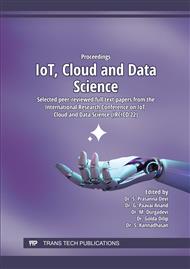p.60
p.72
p.80
p.88
p.96
p.103
p.111
p.125
p.137
Face Mask and Social Distancing Detection Using Faster Regional Convolutional Neural Network
Abstract:
Face masks and social distancing is essential for many infectious diseases that spread through micro-droplets. According to WHO, the preventive measure for COVID-19 is to follow social distancing. Face Detection has expanded as a widespread concern in Computer Vision and Image processing. Many unique algorithms are developed using Convolutional Architectures to curate the algorithm as accurately as possible. First, the person in the video frames is pinpointed with the aid of Deep Learning (DL). The second step is to calculate the span between any two individuals through approaches of image processing. We aim to use a binary face classifier which will help us analyze the frame and help in detecting any face present irrespective of its alignment. Our proposed technique helps in generating accurate face segmentation masks from any random-sized input picture. We start by using an RGB image of any size, the approach uses Predefined Training for feature extraction. Faster Regional Convolutional Neural Networks are used for training. Here we segment out the faces present in the given image or frame semantically. Faster Regional Convolutional Neural Network (FRCNN) processes the given data faster with higher accuracy. The precision and decision-making are very elevated in Faster RCNN compared to others.
Info:
Periodical:
Pages:
96-102
DOI:
Citation:
Online since:
February 2023
Authors:
Price:
Сopyright:
© 2023 Trans Tech Publications Ltd. All Rights Reserved
Share:
Citation:


